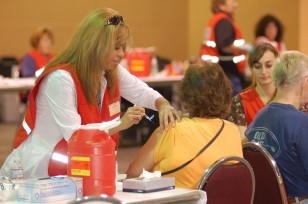
Medical Reserve Corps (MRC) is a national network of volunteers, organized locally to improve the health and safety of their communities.
The MRC network currently comprises over 180,000 volunteers in 830+ units located throughout the United States and its territories.
MRC units are community-based and function as a way to locally organize and utilize medical and non-medical volunteers who want to donate their time and expertise to prepare for and respond to emergencies and promote healthy living throughout the year. MRC volunteers supplement existing emergency and public health resources.
About the Medical Reserve Corps
After the September 11, 2001 terrorist attacks, many Americans asked, “What can I do to help?” Public health professionals were among those who wanted to volunteer their services, but many were not able to find a way to do so. While these professionals had applicable skills sets, they could not be deployed. This was because they were not identified, credentialed or trained in advance. So, the Medical Reserve Corps was created to build a group of people who can assist existing local public health in the event of a true public health emergency or disaster.
MRC was originally a partner program with Citizen Corps and resided under HHS’ Office of the Surgeon General. In 2015 the MRC was welcomed into HHS’ Office of the Assistant Secretary for Preparedness and Response (ASPR) Office of Emergency Management family. MRC also works closely with the National Association of County and City Health Officials (NACCHO) to enhance MRC units’ ability to meet local, state, and national needs through collaboration, coordination, and capacity-building activities.
MRC units engage volunteers to strengthen public health, improve emergency response capabilities, and build community resiliency. They prepare for and respond to natural disasters, such as wildfires, hurricanes, tornados, blizzards, and floods, as well as other emergencies affecting public health, such as disease outbreaks. They frequently contribute to community health activities that promote healthy habits.
Volunteers include medical and public health professionals such as physicians, nurses, pharmacists, dentists, veterinarians, and epidemiologists. Many community members with non-medical backgrounds—interpreters, chaplains, office workers, legal advisors, and others—can fill other key support positions.

Some examples of activities that MRC volunteers participate in and support include:
- Emergency Preparedness and Response Trainings
- Mass Dispensing Efforts
- Emergency Sheltering
- Vaccination Clinics
- Responder Rehab
- Health Education and Promotion
- Disaster Medical Support
- Outreach to Underserved Community Members
- Medical Facility Surge Capacity
- First Aid During Large Public Gatherings
- Engaging Youth in Public Health Activities
- Planning, Logistical & Administrative Support
- Health Screenings
- Veterinary Support and Pet Preparedness
- and more!
Learn how to volunteer or partner with your local Medical Reserve Corps and visit the MRC site to learn more about this great organization.
MRC Network Well Check Webinars
MRC Network Well Check interactive webinars provide MRC unit leaders and State Coordinators with information on a wide variety of topics, largely determined by members’ interests and needs. Through these ongoing wellness check-ups of the MRC network, members will be provided a platform to connect, share, and learn with your peers and leadership, plus some members will also be asked to serve as presenters.
Webinars are typically held on the first Tuesday of each month at 2p ET and run about 60 minutes long primarily focusing on a specified topic. Many include a Q & A period and highlights from the field, as well.
Many MRC units use customized It’s A Disaster books
Since Medical Reserve Corps’ creation in 2002 many Health Departments and MRCs (+ EMs, CERTs, etc.) have purchased our 266-page preparedness and first aid manuals customized both in the print process and using standard red books with stickers for volunteers, events and local communities.

Our IT’S A DISASTER! bulk price is only $4.50 U.S. each delivered (70% off list on 10 or more copies) … and we can customize them for free to include data about your MRC unit, how to become a volunteer, public health information and more. And our book qualifies as community education on most grants providing about a $4-to-$1 return that can be used on matching grant programs.
Download a free portion of our book in PDF and learn how to order paperbacks (or ebooks) at www.fedhealth.net or call 520.907.2153.
